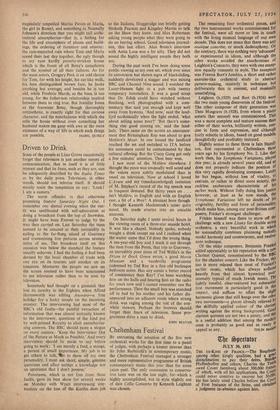Cheltenham Festival
BY entrusting the selection of the five new orchestral works for the first time to a panel of judges, with perhaps a keener interest than Sir John Barbirolli's in contemporary music, the Cheltenham Festival managed a stronger and more representative programme of British contemporary music this year than for some years past. The only concession to conserva- tive taste was on the last night, for which a highly accomplished, but in style slightly out of date Cello Concerto by Kenneth Leighton was .chosen. The remaining four orchestral pieces, and the two instrumental works commissioned for the festival, were all more or less in touch with the living musical language of our own decade. This does not mean that there was anY tnusique concrete, or much dodecaphony. On the contrary, there was nothing very 'advanced' or experimental in idiom, and although the other works avoided the anachronism of Leighton's Concerto, they were with one excel,' tion equally romantic in style. The exception was Francis Burt's Iambics. a short and rather exercise-like orchestral study in abstract pattern-making, masterly in technique but deliberately thin in content, and musicallY unsatisfying.
Leighton (b.1929) and Burt (b.1926) were the two main young discoveries of the festival. The other composer of their generation vitts Thea Musgrave (b.1928), from whom a piano sonata (her second) was commissioned. TO was a more complete and mature success tharl either of their works, brilliantly written, con' else in form and expression, and although fairly eclectic in idiom, based on good models, thoughtfully and profitably imitated.
Slightly senior to these three is lain Han'd' ton, first represented at Cheltenham three years ago by his Symphony No. 2. Like that work then, his Symphonic Variations. plaYed this year, is already several years old, and so, does not properly indicate the position oi this very rapidly developing composer. LatelY he has begun, without loss of vitality, rel restrain, or rather to direct more strictly, the reckless exuberance characteristic of 1I18 earlier work. Without fully doing him justice however, at least as he now stands, the Symphonic Variations left no doubt of hie originality, fertility and force of personalitY, which make him, among our post-Britten cony posers. Fricker's strongest challenger. Fricker himself was there to stave off the challenge with a new Litany for double strittO orchestra, a very beautiful work in which he successfully combines plainsong mclodY, modal harmony and counterpoint, and twclee. note technique. Of the older composers, Benjamin Frankel added appreciably to his reputation With a 11,0e/ Clarinet Quintet, commissioned by the BPI' for the chamber concert. Like the Frickcr, thi,e too is more relaxed than most of Frankel! earlier music, which has always suffer! heavily from that almost hysterical over intensity typical of much Jewish music. The, lightly tuneful, clear-textured but substantial first movement is particularly good in thie respect, and suffices to offset the sligbt harmonic gloom that still hangs over the othef two movements—a gloom already relieved 9 the skilfully applied colour of the amine, writing against the string background. Go0,1: clarinet quintets are not two a penny, and thl' is a useful addition that among the modelli,„ ones is probably as good and as ready 1,e


































 Previous page
Previous page